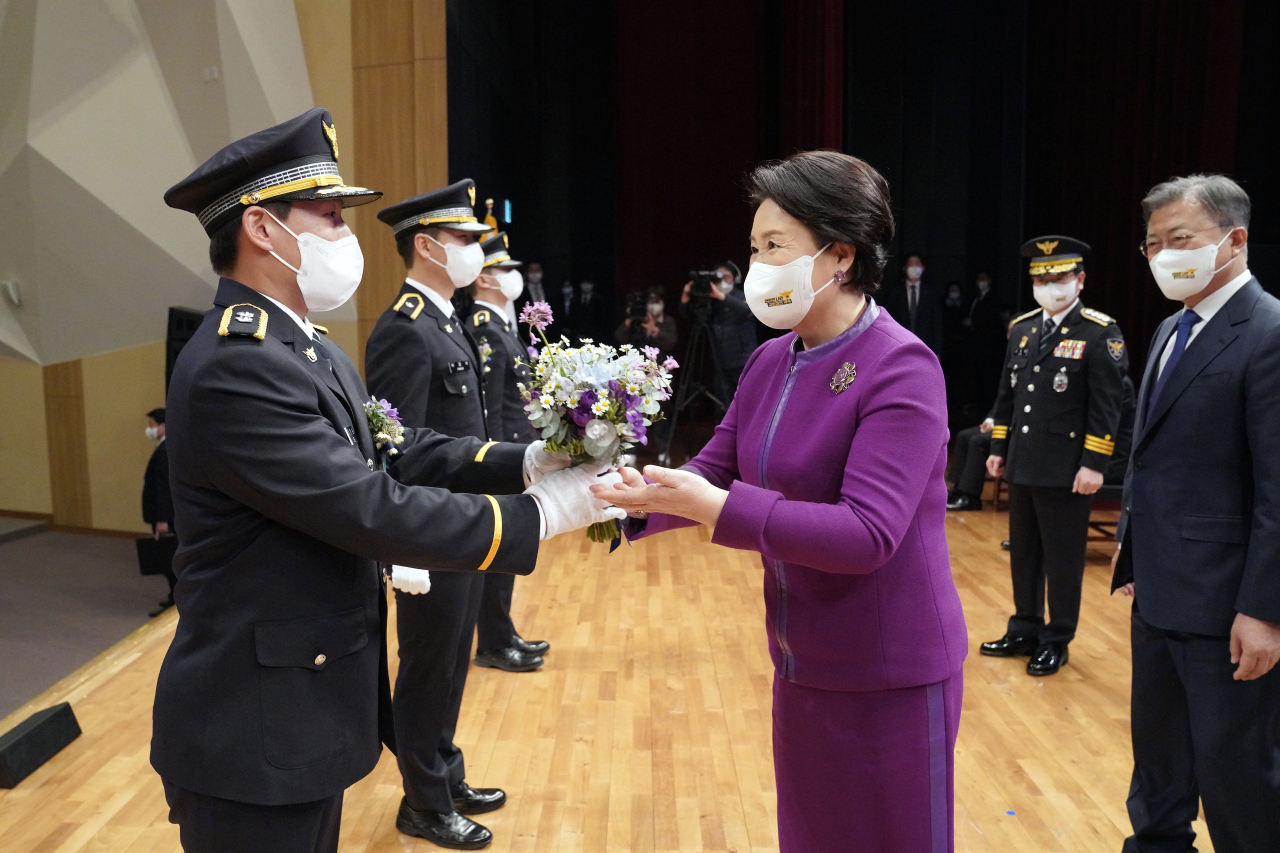Controversy is brewing over first lady Kim Jung-sook’s expenses over the past five years, particularly over the cost of her clothes, shoes, jewelry and accessories.
Some have accused Kim and the presidential office of abusing their power and spending billions of won of taxpayer money on rare and fashionable items for Kim during President Moon Jae-in's five-year term, requesting Cheong Wa Dae to disclose information on its off-the-record expenses.
Local civic group Korea Taxpayers' Association in 2018 filed a request with Cheong Wa Dae to release information on how much the Moon administration’s off-the-record expenses, including how much it spent on clandestine operations and spending protocol for Kim's special activity expenses.
Special activity expenses are budgetary spending allowed for the National Intelligence Service, the prosecution and other key government agencies in carrying out intelligence operations.
The presidential office is also entitled to use special activity expenses for intelligence operations. However, as details of special activity expenses are not revealed publicly after use, the civic group suspected the Moon administration of abusing its spending power. They allege that Kim bought expensive clothes and accessories based on her husband's presidential authority.
The presidential office turned down the civic group's request for disclosure shortly after it was filed, saying the disclosure could undermine public interest. The Korea Taxpayers' Association responded by filing a lawsuit with the Seoul Administrative Court the same year to reverse the decision.
The court earlier this month ruled in favor of the civic group, but the presidential office appealed, repeating its earlier message that the disclosure could undermine public interest.
"The people are interested in how much of the national budget was used to prepare clothes for the president and the first lady, and how much was the price of each lunchbox provided at Cabinet meetings," the Korea Taxpayers' Association said in a statement on March 2 upon the decision of the presidential office to appeal the court ruling.
"We are not in an era where being curious about this information and asking for it is enraging the heavenly almighty," the group said.
Over the course of five years, Kim was seen wearing a diverse array of clothing, jewelry and accessories, many of which are suspected to be rare and specially crafted by famous fashion designers. Supporters of Moon and Kim have refuted the claim, saying many of them seem to be imitations.
Criticism is especially high on the Moon administration, as his party was at the forefront of criticizing impeached President Park Geun-hye for buying expensive clothes during her presidential term.
The Democratic Party of Korea said in a commentary in 2016 that Park is suspected of spending 740 million won ($603,700) in buying clothes over the four years she served as president, claiming she should be more attentive to "the common people who contemplate even when spending just 10,000 won."
The Moon administration rose to power after Park’s impeachment, vowing then to increase transparency in a bid to fight corruption and incompetency arguably apparent in the Park administration.
While the amount of special activities expenses spent by the government was reduced from 800 billion won a year during the Park administration to 300 billion won a year during the incumbent administration, how the money was spent on what activities has remained undisclosed to the public.
Even if the remaining legal proceedings favor the civic group and calls grow for the presidential office to reveal the information on special activities expense for Kim, the record is expected to remain in the shadows for the next 30 years.
According to the Act on the Management of Presidential Archives, presidential records subject to non-disclosure can be disclosed "when 30 years elapse after the end of the year of their creation," which is subject to extension if the records deem likely to "materially impede the national security."
The presidential office is entitled to designate the relevant records as presidential records subject to non-disclosure, as it has repeatedly argued that its disclosure could undermine public interest. The records on special activities expenses is expected to be designated as presidential records when Moon’s term officially ends May 9.
Courts will have to turn down the civic group’s appeal without proceeding further if the information is later categorized as presidential records, as the presidential office is no longer able to provide the information, which means that the lawsuit can no longer proceed as filed.
Presidential records, once branded, are transferred from the presidential office to the Presidential Archives, a Sejong-based institution that "manages presidential records permanently, equipped with facilities and equipment necessary for the permanent preservation of presidential records."
By Ko Jun-tae (
ko.juntae@heraldcorp.com)




![[Herald Interview] 'Trump will use tariffs as first line of defense for American manufacturing'](http://res.heraldm.com/phpwas/restmb_idxmake.php?idx=644&simg=/content/image/2024/11/26/20241126050017_0.jpg)

![[Health and care] Getting cancer young: Why cancer isn’t just an older person’s battle](http://res.heraldm.com/phpwas/restmb_idxmake.php?idx=644&simg=/content/image/2024/11/26/20241126050043_0.jpg)

